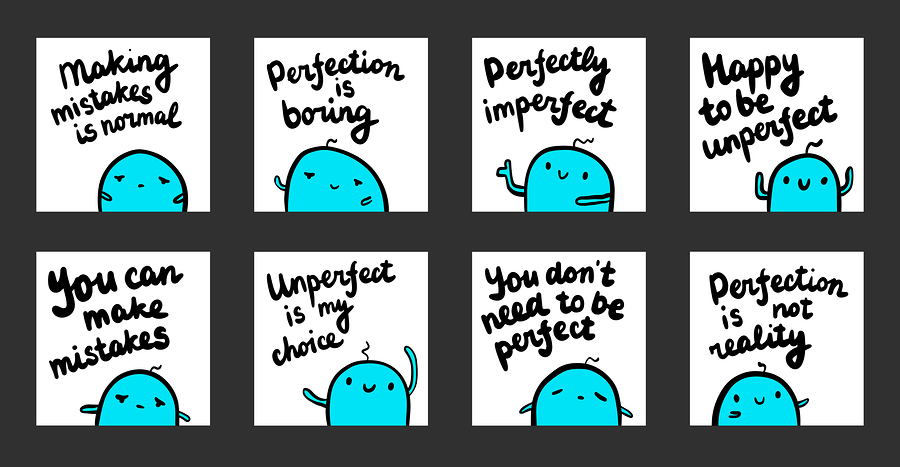
In our driven culture, Type A personalities take pride in perfectionist tendencies. Yet recent research indicates perfectionism can predict depression or at least be associated with depression when there is additional life stress. Mental health professionals address perfectionism in clinical sessions with clients and have similar thoughts about the increase and ways to treat it.
Several experts, including Dr. Roxy Zarrabi, Psy.D. point to social media as a culprit in perfectionist tendencies because it “contributes to unrealistic expectations and frequent social comparison which are often symptoms of perfectionism. Perfectionism can become exacerbated when someone starts a new chapter, such as a new school or job. In such situations, the person may feel as if they are a small fish in a big pond and nothing they do is good enough."
Although social media can be a “wonderful way to stay connected to the people who matter to you.” Victoria Tarbell, a licensed mental health counselor, also has concerns about its use. She finds it “can be a breeding ground for comparison and feelings of inadequacy. Most people are familiar with the term ‘highlight reel’ and that’s often what we’re seeing from others on their social media accounts; the best, most interesting parts of lives, captured at the right angles, accompanied by perfectly crafted captions. Common thoughts from viewing the social media accounts of others are: ‘I’m not doing enough’ or ‘My life isn’t as interesting as everyone else’s’. These thought processes are very dangerous and can lead to anxiety, depression, and perfectionist tendencies.”
Tarbell talks to clients about how thoughts, feelings, and behaviors are all connected and reinforce one another. “If you challenge or change one of these three, you disrupt the unhealthy cycle.” But she doesn’t tell clients to try to change feelings. “Your feelings are your feelings! But sometimes the thoughts that create our feelings deserves a bit of attention.”
She connects this to social media use. “If you are on social media and find yourself feeling depressed or anxious, take a pause and try to identify what thoughts are contributing to those feelings. Most likely, they will be ‘I’m not doing enough’ or ‘My life isn’t as interesting as everyone else’s’. Try to notice, challenge, and replace those thoughts with something more supportive of your well-being. A replacement thought may involve acknowledging your own accomplishments (we tend to minimize these) or a reminder that ‘I’m only seeing this person’s highlight reel’. Try these thoughts on and see how they impact your feelings and behaviors.”
Tarbell’s approach addresses the inner critic which Zarrabi also believes is important in addressing perfectionism. Zarrabi says, “One of the most helpful ways to combat one’s inner critic and address perfectionism head-on is to practice self-compassion. So often people are their own worst critic and are compassionate towards others but have difficulty being supportive to themselves. When someone is feeling critical towards themselves, it can help to ask what they would say to a friend in a similar situation and then apply those supportive statements to themselves.”
Rebecca Newkirk, LSW encourages clients to examine what it is the critics are protecting them from by pushing so hard. She explained that over time “the ‘self’ gains the trust of the inner critic, and shows it compassion and gratitude, giving it permission to relax and not hold the same role it has been holding all this time. In this perspective, we view all parts of self as well-meaning, even the critic, and we want to say to these parts, ‘I see you, you matter, and you can rest now.’ “
Susie Rinehart, MS, author of Fierce Joy; Choosing Brave over Perfect, advocates for focusing on progress to combat perfectionism. She says, “The opposite of joy is not sadness, but perfectionism. It prevents us from trying new things, asking for help, or feeling worthy. I work with clients to choose brave over perfect when making small decisions and encourage them to celebrate progress. Instead of asking, “What did I get done today?” ask “Where did I make progress today?” The world doesn’t need us to be perfect; it needs us to contribute to the common good.”
One of the simplest solutions is redirecting ones’ attention. Jeff K. Larsen MA, MFT, a therapist, says he “instructs clients to place post-it notes on their bathroom mirror as well the inside of their front door which state ‘Perfectionism is neither the journey nor the goal’. Every time a client finds themselves in a tough situation where they seek to be perfect, I have them say out loud, ’Good Enough!’ Then I have them keep a journal about the number of times they have to do that in between sessions. The goal is to decrease the number of self interventions needed.”
Although approaches to treating perfectionism vary, all agree that spending more time looking at one’s inside is a better path to self-care than looking at other’s outsides.
Tina Arnoldi, MA is a marketing consultant and freelance writer in Charleston SC. Learn more about her and connect at TinaArnoldi.com